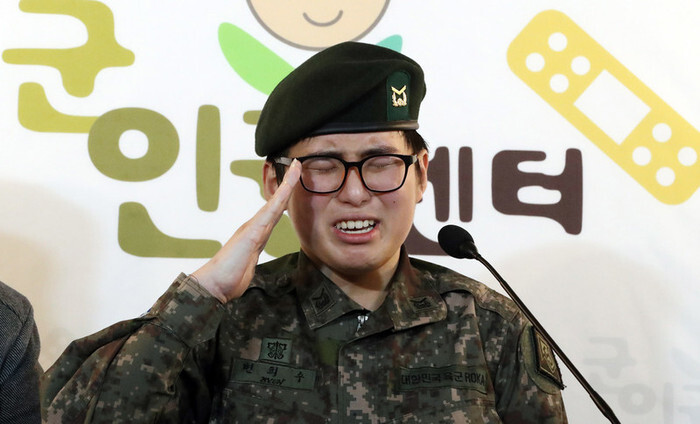hankyoreh
Links to other country sites 다른 나라 사이트 링크
[News analysis] The S. Korean military’s war against the LGBT community

“Staff Sergeant Byun Hui-soo had the courage to reveal herself to the world, while standing on the brink of a precipice. How long will the military maintain such a cowardly attitude?” A former officer in the South Korean army, identified here as “K,” shared his feelings about the South Korean military’s discharge of Byun, the country’s first transgender soldier, during an interview with the Hankyoreh on Jan. 28.
K chose to resign from the military while being investigated as part of a campaign to ferret out gays soldiers in the army in 2017. It was an emotional experience for K to see Byun being forced to leave the military at midnight of the very day she’d so bravely held a press conference in which she’d tearfully begged for a chance to defend the nation as a soldier. “The army is still unable to embrace LGBT people,” K observed.
The hunt for gay soldiers in March 2017 was brought to light by the Center for Military Human Rights Korea (CMHRK), which explained that the orders had been given by Gen. Jang Jun-kyu, chief of staff for the army. The army launched an investigation into gay soldiers for their breach of Article 92-6 of the Military Criminal Act, which prohibits sexual relations between soldiers of the same sex, leading to the arrest of an army captain that April. While some 40,000 Koreans submitted a petition calling for the captain’s release, 23 gay soldiers were booked on criminal charges, with nine of the cases going to court. Prosecutors concluded that 11 other soldiers were probably guilty, but gave them a suspended indictment without taking the cases to court.
Homosexuals are also targets in the navy. When one homosexual soldier told a barracks counselor about having consensual sexual relations with other soldiers, the counselor filed a report about the conversation, triggering an investigation by the military police. The soldier was eventually given a suspended indictment.
LGBT soldiers in danger of being discharged against their willAs the hunt for gay soldiers and Byun’s dismissal make clear, LGBT soldiers are in danger of being forced to leave the military against their will because of their sexual identity or orientation. Byun is one of five soldiers who have been or are likely to be discharged because of their LGBT status. Two senior army officers who received suspended sentences during the hunt for gay soldiers are about to be discharged after one was turned down for long-term service and the other failed to get a promotion last year. Two others have decided to leave the service after a humiliating investigation in which military prosecutors asked prying questions about their sexual practices, the CMHRK said.
“Since the other convicted soldiers are likely to go through the same process, the number of discharged LGBT soldiers will go up,” said CMHRK Secretary-General Kim Hyeong-nam.
LGBT soldiers point out that there’s nothing criminal about their sexual identity differing from that of others. “LGBT people might look different and even weird, but there are plenty of people in the army who are even weirder. There’s no empirical evidence that LGBT people degrade the army’s combat capability,” said K, the former army officer.
“The tough training I went through after being commissioned as an officer gave me great pride in the army. But after the hunt for gay soldiers, I’ve come to regard the army as a terrifying organization, and it gives me the chills,” he admitted.
After the army decided to dismiss Byun from the service, NGOs have been calling for the end of discrimination against LGBT soldiers.
“This decision by the army perpetuates the anachronistic practice of regarding a specific part of the male anatomy as the qualification for serving in the military and discriminating against and excluding those who don’t conform,” the Korean Women’s Associations United said in a statement.
The Korean Confederation of Trade Unions (KCTU) also released a statement on the issue. “Byun’s discharge from the army is an act of discrimination for sexual identity, as well as a serious infringement of the rights of labor.”
By Kim Min-je, staff reporter
Please direct comments or questions to [english@hani.co.kr]

Editorial・opinion
![[Column] When ‘fairness’ means hate and violence [Column] When ‘fairness’ means hate and violence](https://flexible.img.hani.co.kr/flexible/normal/500/300/imgdb/original/2024/0516/7417158465908824.jpg) [Column] When ‘fairness’ means hate and violence
[Column] When ‘fairness’ means hate and violence![[Editorial] Yoon must stop abusing authority to shield himself from investigation [Editorial] Yoon must stop abusing authority to shield himself from investigation](https://flexible.img.hani.co.kr/flexible/normal/500/300/imgdb/original/2024/0516/4417158464854198.jpg) [Editorial] Yoon must stop abusing authority to shield himself from investigation
[Editorial] Yoon must stop abusing authority to shield himself from investigation- [Column] US troop withdrawal from Korea could be the Acheson Line all over
- [Column] How to win back readers who’ve turned to YouTube for news
- [Column] Welcome to the president’s pity party
- [Editorial] Korea must respond firmly to Japan’s attempt to usurp Line
- [Editorial] Transfers of prosecutors investigating Korea’s first lady send chilling message
- [Column] Will Seoul’s ties with Moscow really recover on their own?
- [Column] Samsung’s ‘lost decade’ and Lee Jae-yong’s mismatched chopsticks
- [Correspondent’s column] The real reason the US is worried about Chinese ‘overcapacity’
Most viewed articles
- 1Could Korea’s Naver lose control of Line to Japan?
- 2[Column] Welcome to the president’s pity party
- 3[Column] US troop withdrawal from Korea could be the Acheson Line all over
- 4Naver’s union calls for action from government over possible Japanese buyout of Line
- 5[Editorial] Korea must respond firmly to Japan’s attempt to usurp Line
- 6Korea cedes No. 1 spot in overall shipbuilding competitiveness to China
- 7[Editorial] Yoon must stop abusing authority to shield himself from investigation
- 8[Column] When ‘fairness’ means hate and violence
- 9Korean opposition decries Line affair as price of Yoon’s ‘degrading’ diplomacy toward Japan
- 10Second suspect nabbed for gruesome murder of Korean in Thailand, 1 remains at large